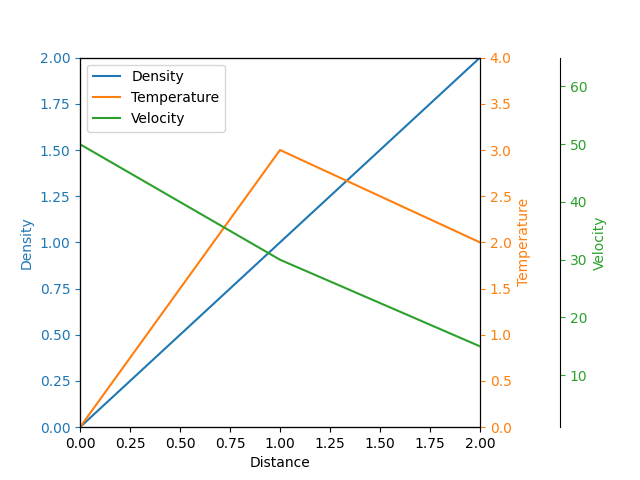Note
Click here to download the full example code
Multiple y-axis with Spines#
Create multiple y axes with a shared x-axis. This is done by creating
a twinx axes, turning all spines but the right one invisible
and offset its position using set_position.
Note that this approach uses matplotlib.axes.Axes and their
Spines. Alternative approaches using non-standard axes
are shown in the Parasite Axes demo and
Parasite axis demo examples.

import matplotlib.pyplot as plt
fig, ax = plt.subplots()
fig.subplots_adjust(right=0.75)
twin1 = ax.twinx()
twin2 = ax.twinx()
# Offset the right spine of twin2. The ticks and label have already been
# placed on the right by twinx above.
twin2.spines.right.set_position(("axes", 1.2))
p1, = ax.plot([0, 1, 2], [0, 1, 2], "C0", label="Density")
p2, = twin1.plot([0, 1, 2], [0, 3, 2], "C1", label="Temperature")
p3, = twin2.plot([0, 1, 2], [50, 30, 15], "C2", label="Velocity")
ax.set(xlim=(0, 2), ylim=(0, 2), xlabel="Distance", ylabel="Density")
twin1.set(ylim=(0, 4), ylabel="Temperature")
twin2.set(ylim=(1, 65), ylabel="Velocity")
ax.yaxis.label.set_color(p1.get_color())
twin1.yaxis.label.set_color(p2.get_color())
twin2.yaxis.label.set_color(p3.get_color())
ax.tick_params(axis='y', colors=p1.get_color())
twin1.tick_params(axis='y', colors=p2.get_color())
twin2.tick_params(axis='y', colors=p3.get_color())
ax.legend(handles=[p1, p2, p3])
plt.show()